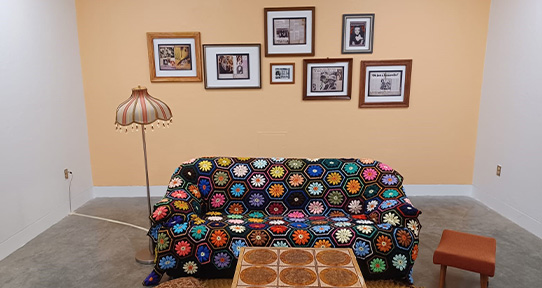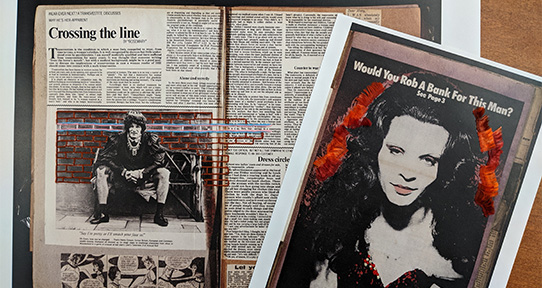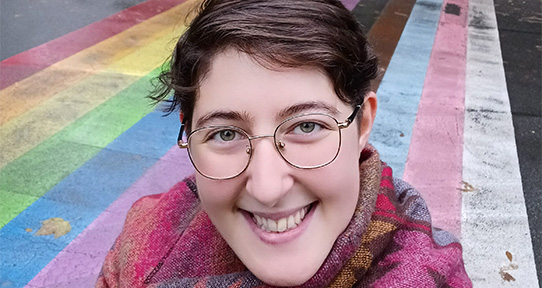From Paper to Stitch: Exploring the Intersection of Art, History, and Trans+ Narratives

by: Şansal Güngör Gümüşpala, Lowens-Libraries Fellow
In this brief article, I would like to explain how many aspects of my life come together and create an amazing fellowship process with immense support from the University of Victoria (UVic) Libraries and my dear partner Cameron.
With the encouragement of my partner last fall, I applied to the Peter and Ana Lowens University of Victoria Libraries Special Collections Student Fellowship. My application was a bit last minute, but it was very genuine. In a short time, I learned that I got accepted to the program. In the fellowship, I had a great time meeting with other fellows and my mentors. We had interesting workshops through which I learned a lot about various topics such as archives, paleography, bookbinding, etc. The best workshop for me was the papermaking workshop, in which we learned to make paper from scratch with the amazing artist Frances Hunter. It was also a great experience because we could bring a plus one, and learning how to make paper with my partner was such a fun activity. The last workshops were immensely helpful in designing the exhibition process and determining how to showcase my artwork.
For this project, I have focused on the scrapbooks found in the Transgender Archives' University of Ulster/Richard Ekins collection. After coming to Victoria and seeing those scrapbooks, I felt called out and sensed a deep connection with these scrapbooks. They felt very personal to me. As an LGBTQ+ person who lived 25 years in Türkiye, I was also scrapbooking with newspaper articles. The representation of people most of the time would be very negative, but still knowing that people like me existed was an important reminder that I was not alone. In the archives, the remarkable scrapbooks spanning 1964 to 1979 provide a window into the gender and sexual identity landscape within the popular culture of their time. They were created by Adele Anderson, a member of the renowned British satirical singing trio, Fascinating Aïda. These scrapbooks offered a truly captivating glimpse into the rich cultural tapestry of that era, and my intention was to reintroduce them to the public eye, inviting them to be reimagined through my creative stitching.

I chose embroidery on paper as my medium because I felt like that would unite my academic life and creative artistic life together. I strongly believe that embroidery is a powerful tool for storytelling and reviving interest in important pieces of history. Using high-quality photocopies of selected pages of the scrapbooks, I have transformed them by embroidering colorful threads and capturing various elements from the newspaper articles. Through my stitches, I brought history to life, challenged stereotypes, and celebrated the resilience of the trans community. My exhibition "Sewing Trans Memories'' allowed attendees to connect with different senses and honor the diverse narratives of trans individuals. While designing the gallery room, I played with the concepts of public and private. These publicly available newspapers were collected in the privacy of a home, and with their donation to the archives, they became public again.
While preparing for the exhibition, with the support of my mentors, I decided to hold a workshop that is complementary to my project. I was wondering how trans+ people of today would create a collaborative scrapbook. I wanted to include stories and see the difference between scrapbooks created 50 years ago and today. I understand that holding this type of public event in a university 50 years ago would be incredibly challenging; in contrast, with the support of UVic Libraries and the Fine Arts Visual Arts department, it was such an easy process and a joy to create this workshop. The "Creating Trans Memories'' workshop created a safe and cozy space for self-identified trans+ individuals to share their stories and experiences. The workshop highlighted the power of storytelling through scrapbooks and encouraged participants to preserve their memories in a tangible and meaningful way.
As a sociology master's student, this fellowship process has been particularly meaningful as it has allowed me to explore the intersection of art, history, and social issues, shedding light on the importance of preserving marginalized narratives and challenging societal norms through creative expression. In addition, it allowed me to witness art and community-engaged activities' real transformative power.

I am incredibly grateful to my mentors, Heather Dean, Christine Walde, and Beth Stuart, for their invaluable guidance and support throughout this journey. Moreover, I am very thankful to my partner Cameron for all of their support from beginning to end. This experience, supported by the Peter and Ana Lowens University of Victoria Libraries Special Collections Student Fellowship, has been deeply meaningful, both for my community and me, for fostering inclusivity and empathy. I hope this project's emotional impact will inspire others to embrace inclusivity and deepen their understanding of the trans+ experience.
